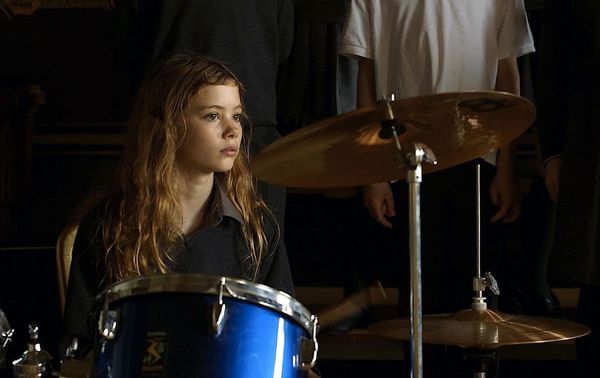 |
| School Life co-director David Rane on Florrie: "There is a lovely transition with her. Initially her hair is very neat and quite smart and then it slowly …" |
The filmmakers Neasa Ní Chianáin and David Rane's gentle, subtle approach to the life of students and faculty at Headfort, a private primary boarding school in Ireland - with a special spotlight on Amanda and John Leyden, a couple who taught there for decades - manages to chisel out portraits full of humour, sometimes warm, sometimes slightly absurd, that always welcome us to reflect on what we see and what exists, off screen, outside in screen land, where we live.
We meet Ted, a boy with dyslexia, who, encouraged by Amanda, discovers acting by way of Shakespearean ghostliness, and see new paths opening up. Eliza, smart and shy, comes out of her shell. Rarely has the sound of giddy chatter caused so much joy and a sense of victory. The camera of Ní Chianáin has the light touch of a welcomed guardian angel, not an intruder.
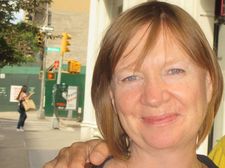 |
| School Life co-director and cinematographer Neasa Ní Chianáin on filming at Headfort School: "There are moments of chaos and order, that's what always struck us." Photo: Anne-Katrin Titze |
Florrie's experience modeling, at a very young age, brought her to the school as a much needed antidote to the arena of surface value. She flourishes in this environment where glamour seems no more than a joke. She and little Barbara are the school's drummers.
School Life (In Loco Parentis), in quite miraculous ways, holds up a mirror to the world at large in the teens of the 21st century. As if sliding down a Möbius strip, we end up on the other side, where modern technology has not been allowed to take over children's minds. By simply looking at their faces, you genuinely want to hear what they have to say. It pays to take kids seriously - any respectable fairy tale will tell you that.
Anne-Katrin Titze: What came first, this particular school? Or was it that you wanted to make a film about a school and then found this one?
Neasa Ní Chianáin: The school came first. We were looking for an alternative and a broader education for our children. We started locally and then realised we would have to move somewhere and then we found Headfort on a website.
It was the letter the headmaster had written, welcoming prospective parents, where he talked about, you know, that the happiness of the child was at the center of the child's education and that they had a very holistic education. That was kind of the calling card for us.
David Rane: The film came really at the same time. Before the first meeting with the headmaster, he had seen some of Neasa's other films. We had things in common and we started talking about film and about the idea of a film.
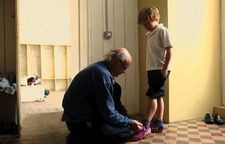 |
| David Rane on John Leyden with James: "That is for me the most beautiful moment in the film. It shows the way John is with the children." |
And Neasa and I both went to boarding school. For us it was just a fantastic opportunity. I went when I was seven. To the UK from Nigeria. It was a big separation from my parents. It was quite difficult. Neasa had a good time.
NNC: Well, I was a little older when I went away to school. I was 11.
AKT: That does make a difference.
NNC: Yeah, it was quite an innocent upbringing. I made lifetime friends there.
AKT: One of my favorite moments is the tying of the shoe. It's a fantastic moment you happen to capture, because it doesn't stop when we think it stops.
DR: That is for me the most beautiful moment in the film. It shows the way John is with the children. He's gruff and abrupt and yet he is loving. At the same time it shows a bit of his fragility and vulnerability. He's an elderly man. And this little kid says: "Do you want help to get up?" It's just beautiful.
AKT: It's perfect symmetry. The little kid already learned that - you help me, I help you. This is what education should be. A few things about the house - I loved when nature envelops the school. The fog, the snow, and then the flower explosion. It's beautiful and connects us to time.
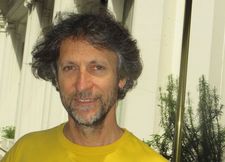 |
| David Rane: "The great thing about the Headfort kids is they chat a lot, they talk a lot because they don't have devices." Photo: Anne-Katrin Titze |
NNC: Yes. Because we didn't want to break up the year with "End of Term" and then they all come back. We didn't want to use the traditional flags of a term. Headfort changes dramatically from season to season. The summer is the children's favourite season. We stayed there throughout the year. Had we been working with a crew, it may not have snowed when we were filming. We had that luxury.
AKT: The nature scenes also speak of beauty. The nature scenes are the most aesthetically beautiful ones, I think. Conventionally aesthetically pleasing images is not really what this film is about, is it? It's very messy, good messy.
NNC: There are moments of chaos and order, that's what always struck us. Cyclical time, as you say. Within that, they give the children an immense freedom. Things are pulled back into order as well. We wanted to play with that - the chaos and the order, the serenity and the bedlam.
AKT: Florrie, the child model, is a good example for the need to have a place where it doesn't matter at all what you look like, what you wear, what you have. These concerns are so unimportant in Headfort.
DR: There is a lovely transition with her. Initially her hair is very neat and quite smart and then it slowly …
NNC: … when she's playing cards in the final scene, her hair is all frizzy and standing out and she hadn't bothered combing it.
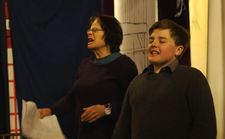 |
| Ted rehearsing with Amanda Leyden |
AKT: The drummer thread is very intriguing. When Florrie starts working on the drums, what happens to the other little girl? She is so wonderful.
DR: Barbara, yes.
NNC: She is still the drummer. John would never let her go.
DR: She is a great character but she wasn't in John and Amanda's class. We would have loved to have more with her.
AKT: That moment …
DR: … when she is so intensely drumming?
AKT: Yes and John tells her "You're not fast enough." And she goes at it and she does it. It's exhilarating.
NNC: The next year, John created a band for Florrie. But Barbara continued to be a main drummer. He would never fire anyone, he was very clear about that.
AKT: I like that you show the instructors talking about how to tell the kids when what they are producing is awful. This is not a school where every not so good thing the kids perform is lauded as marvelous by parents. And everybody else thinks it's …
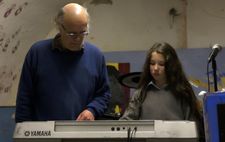 |
| John Leyden teaching Eliza in the band room: "When we first heard her voice, it was wonderful." |
NNC: … dreadful, yeah.
AKT: Ted, who is dyslexic becomes a Shakespearean ghost. Eliza, who has trouble talking to people goes through a remarkable transformation. It must have been difficult to pick individuals to feature?
DR: We didn't really pick them during the filming. We tried to cast the net as widely as possible. We didn't want to single out children. We filmed with a lot more than those three. It was in the edit that their story really came to the surface.
NNC: Eliza, from the beginning, cinematically she was amazing. She captures the screen.
AKT: The little flower in her hair.
DR: And the way she moves, like a Victorian lady.
NNC: If she hadn't blossomed in the end, I don't think we would have ever used that storyline because it would be unfair to suspend her forever as this shy, retiring child. And luckily, she did. It was so magical. When we first heard her voice, it was wonderful.
AKT: Technology plays hardly any role at their school. In one scene a girl in the forest is playing a game on a little screen. We don't really see what it is.
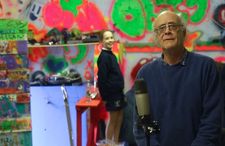 |
| John Leyden and Barbara: "She is a great character but she wasn't in John and Amanda's class. We would have loved to have more with her." |
NNC: Barbara, the little drummer.
AKT: That's her? Oh, I didn't know her by then.
DR: She is reading on a Kindle, actually. She's not even playing a game.
NNC: They get very little access. They're not allowed smart phones at all. They have to have a regular mobile phone.
DR: With no camera.
NNC: And no internet. They get it between 6:30 and 7:30 every evening to call home. Sometimes, not every evening, they can queue up to play games on a computer. And then apart from that it's classes. At the weekend, if they have devices, they let them have the device for an hour or something and that's it. They are very, very strict about that. And consequently, the children play chess in the dormitories, they play cards.
DR: And they go outside. They can't wait to go outside and play.
AKT: There are horses around!
NNC: It's an old-fashioned childhood which is just so refreshing to see.
!["And the way she [Eliza] moves, like a Victorian lady."](/images/newsite/Eliza_225.jpg) |
| "And the way she [Eliza] moves, like a Victorian lady." |
AKT: And doesn't really exist anymore.
NNC: I know. It's every parent's constant battle. Get off the screen! Get off the screen!
AKT: Everywhere you go [we all take a look around the lobby of the Ace Hotel, not a single person is not in front of one type of screen or another]. Is that one of the reasons why you made this film?
NNC: Oh, for us that's really important. That children aren't just left. They don't develop any social skills and they get a very strange window into and perspective of the world, if it's all through screens and devices. They're never in the now.
DR: The great thing about the Headfort kids is they chat a lot, they talk a lot because they don't have devices. Their dormitories - It's like one long sleepover with some friends. A sleepover without iPhones and iPads where they have to talk and have fun together. That was really, really nice there and really special.
NNC: The little ones play chess! The older ones teach the younger ones how to play!
DR: There's a massive reading culture. That really astounded us. The passion that Amanda puts into getting them to read, making sure that every child loves reading. She reads to them. She introduces every book and explains a bit of the background. The children get a sense of drama and a real sense of storytelling.
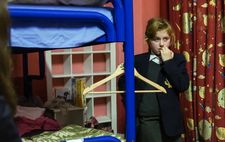 |
| Ellie-Rose in her dorm room at Headfort |
AKT: It's almost funny that Stephen King's The Shining is the book that Florrie has smuggled into the school and that it shows in her essay. That's the other side of reading. You show in the end some students going off to Harrow and to Eton.
DR: Yes! It really builds long-term friendships, a school like that. And they will still be in touch with each other. For life.
AKT: Where are John and Amanda now?
NNC: They're still teaching.
DR: We're good friends with them and John sends us a mail or a text every day. They're sitting at home now. He told me today [on August 23] it's stormy and windy in Ireland. It's very quiet and it's another four weeks or three weeks till school. They would be counting the days to go back. It's wonderful. But they would be doing it in a very wry, dry way: "Oh my god, we've got to go back in three weeks!" But you know that they really love it.
Read what Neasa Ní Chianáin and David Rane had to say on School Life, cinéma vérité and being "big, big fans of observational" filmmaking.
School Life will open at London's Bertha DocHouse on October 13 with Neasa Ní Chianáin and David Rane participating in a post-screening Q&A.





















